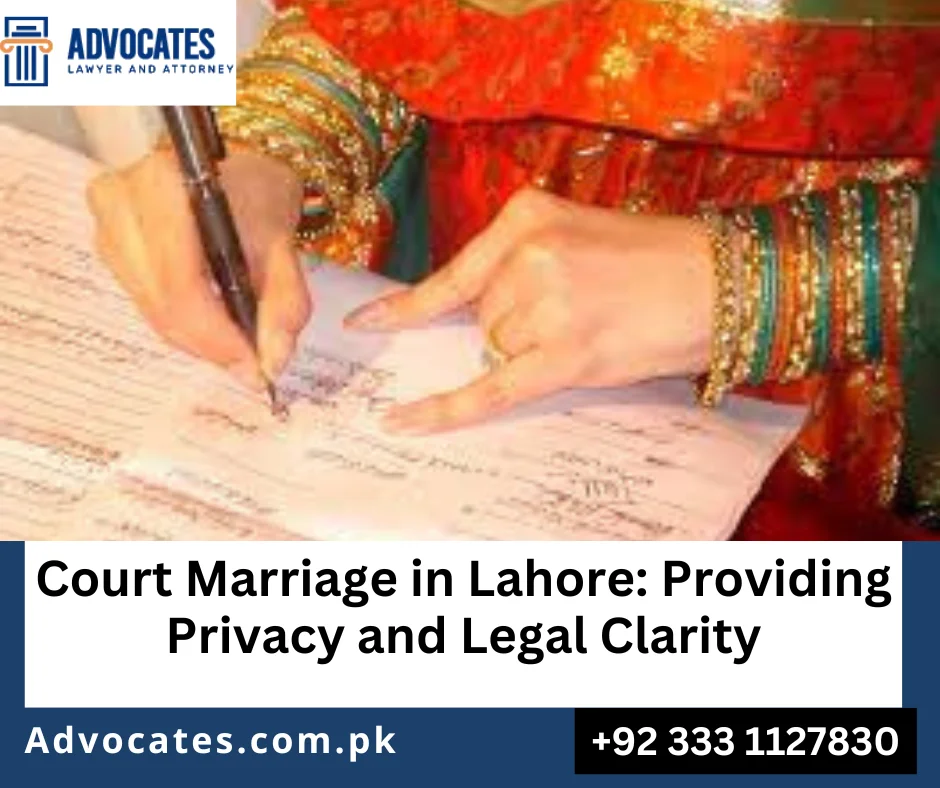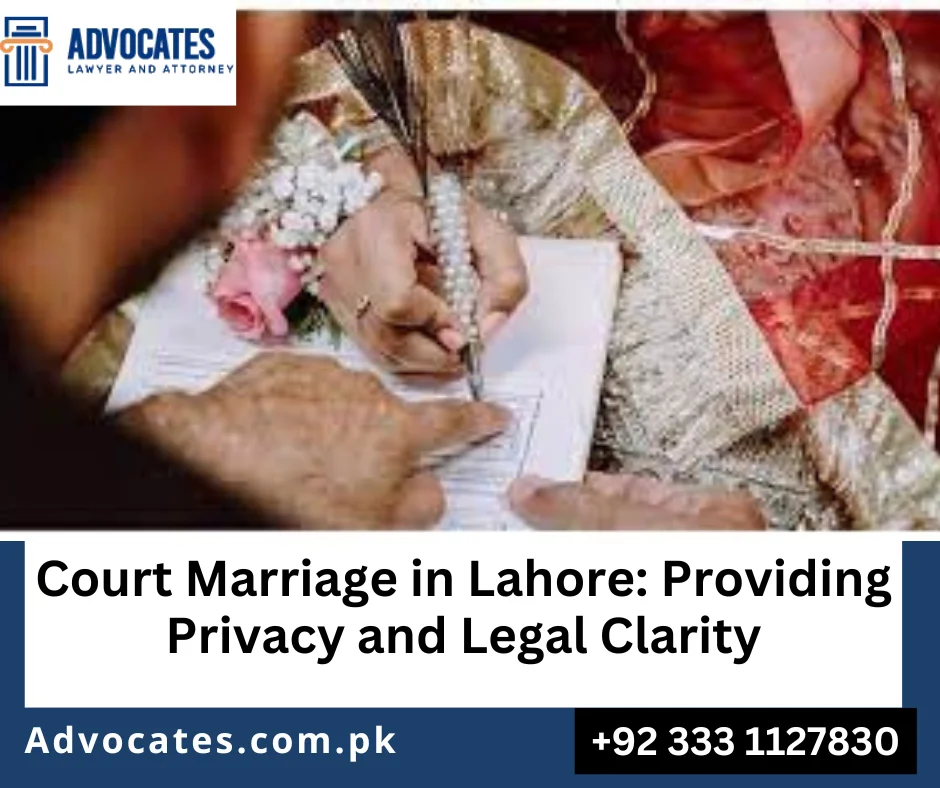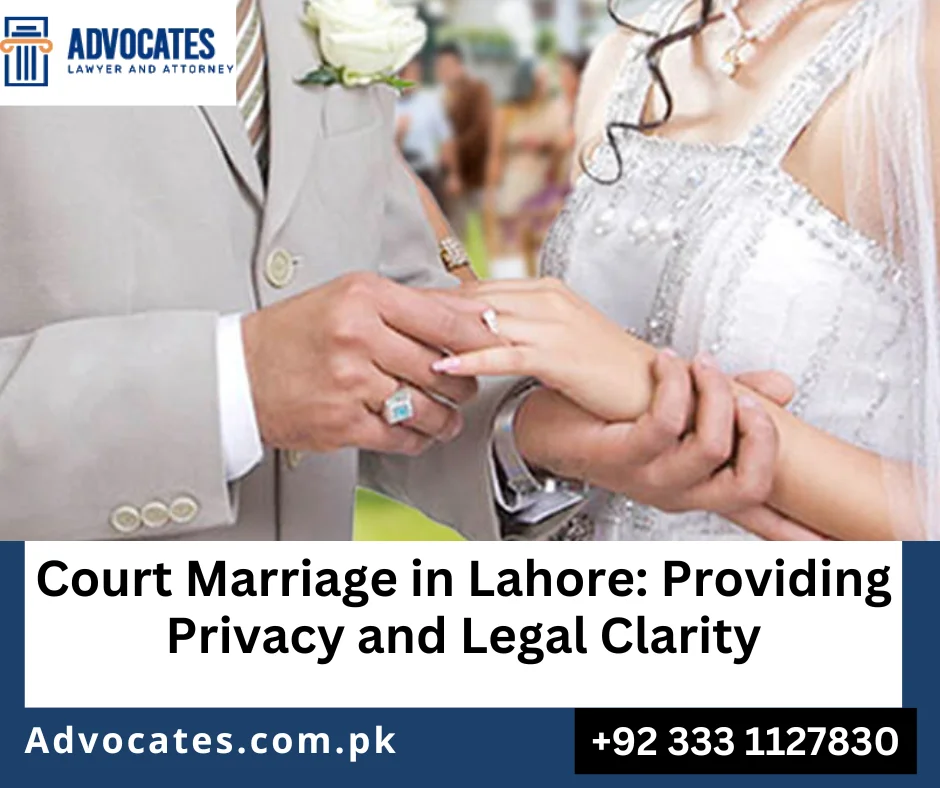Court Marriage in Lahore: Providing Privacy and Legal Clarity
Introduction to Court Marriage
Court marriage, a legally binding union of two individuals facilitated by a judicial authority, presents a distinctive alternative to traditional marriage ceremonies. Unlike traditional marriages, which often encompass cultural customs and extended familial involvement, court marriages are conducted in a more simplified, private manner. This process is recognized and sanctioned by the state, ensuring that the rights and obligations of the spouses are protected under the law.
In recent years, there has been a noticeable increase in the number of court marriages in Lahore. Several factors contribute to this growing trend. First, couples are attracted to the legal clarity that court marriages provide. Since the marriage is documented and processed through the judicial system, it offers an added layer of legal security and transparency that is sometimes absent in informal or non-civil ceremonies. Secondly, court marriages offer a higher degree of privacy compared to traditional weddings, which can be advantageous for individuals who wish to avoid extensive social scrutiny or prefer a more intimate ceremony.
The increasing popularity of court marriages in Lahore also reflects broader societal changes. As more individuals prioritize personal autonomy and legal clarity over cultural or familial expectations, the demand for court marriages continues to rise. The streamlined process, which typically involves a few straightforward legal steps, makes it accessible and appealing to young couples eager to solidify their union without the complexities of a conventional wedding.
Moreover, court marriages provide an inclusive option for interfaith couples or those from different cultural backgrounds who might face opposition from their families or communities. By choosing a court marriage, they can ensure that their union is legally recognized and safeguarded by state law, regardless of external sentiments. This emphasis on privacy and legal protection underscores the growing favorability of court marriages in Lahore.
Legal Framework for Court Marriage in Lahore
In Lahore, the legal foundation for court marriage is built upon several significant laws and regulations designed to ensure the clarity and validity of such unions. The primary legislation encompassing court marriages includes the Muslim Family Laws Ordinance of 1961 and the Hindu Marriage Act of 2017. These legislations establish the necessary framework within which couples, irrespective of their religious backgrounds, can solemnize their union legally and with due privacy.
The Muslim Family Laws Ordinance of 1961 forms the cornerstone for Muslim marriages. It mandates the registration of all marriages, ensuring both the ceremony’s legality and the protection of the couples’ rights under the law. This ordinance outlines the rights and obligations of the spouses, including the stipulation of Mehr (dower) and the procedure for divorce. For Hindus, the Hindu Marriage Act of 2017 serves a similar purpose, defining the fundamental aspects of marriage, such as consent and the conditions necessary for a valid marriage.
Any couple considering a court marriage in Lahore must adhere to these legal requirements, which involve essential steps and documentation. Both parties must provide proof of identity, such as a national identity card or passport, to verify their eligibility for marriage. Additionally, a marriage registration form is to be duly filled and submitted along with affidavits confirming the marital status of both individuals—whether single, divorced, or widowed. For Muslim couples, the presence of two witnesses is also mandatory during the solemnization process. On the other hand, Hindu couples need to ensure that their marriage is witnessed by at least two individuals who can confirm the union’s legality.
By abiding by these regulations and fulfilling the requisite documentation, couples not only legalize their partnership but also shield themselves from future legal disputes or societal objections. The structured framework offered by these laws provides a secure and recognized path for couples seeking to marry in court, thereby giving them a robust legal standing and the privacy they might require.


Step-by-Step Guide to Court Marriage
Embarking on the journey of a court marriage in Lahore involves a series of meticulous steps designed to ensure a legally binding and private union. Knowing these steps beforehand can greatly facilitate a smooth process for couples. Below, we outline the critical stages involved in executing a court marriage, from the initial application to obtaining the marriage certificate.
The first step is to gather the necessary documents. Both parties will need to provide CNIC copies (Computerized National Identity Cards), passport-sized photographs, and an affidavit confirming their relationship status, age, and consent to marry. If either party is previously married, a valid divorce certificate or death certificate of the former spouse must be presented. Additionally, the female party will need to present a free will affidavit, asserting that the marriage is being entered into without any coercion.
Once all documents are assembled, the couple needs to submit their application for marriage registration at the local Union Council or the office of the marriage registrar. The application form must be accurately filled out and accompanied by the necessary documentation. It’s crucial to check that all information matches seamlessly to avoid any delays or rejections.
The next step involves appearing before a magistrate. Both parties must be present, along with their respective witnesses, to formally express their consent and affirmation of the court marriage. During this meeting, the magistrate will verify the authenticity of the documents and the voluntary intent of both individuals to marry. It’s advisable to schedule this appointment in advance to ensure availability and reduce waiting times.
Upon successful verification and declaration, the court will issue a Marriage Certificate (Nikah Nama). This document officially endorses the marriage, making it legally recognized. Couples are advised to obtain multiple copies of the Marriage Certificate for future legal and administrative purposes—such as updating personal records, travel documentation, and any other instances that require proof of marital status.
Following these structured steps can significantly streamline the process, ensuring that the court marriage in Lahore is conducted smoothly and without unnecessary complications. Proper preparation and familiarity with the required formalities go a long way in making the experience both efficient and stress-free for couples.
Benefits of Court Marriage
Opting for a court marriage in Lahore offers numerous benefits, making it an increasingly popular choice for couples. One of the primary advantages is the greater degree of privacy and discretion it provides. Many couples may face societal pressures or family opposition when opting for traditional marriage ceremonies. By choosing a court marriage, they can enjoy a more controlled and confidential process, free from external scrutiny and interference. This is particularly appealing to those who value their privacy and seek a less public union.
Another significant benefit is the legal clarity and security that comes with a court marriage certificate. Unlike traditional marriage ceremonies that might lack formal documentation, a court marriage guarantees an official record recognized by the state. This legal documentation is invaluable in establishing the rights and obligations of both parties, serving as crucial evidence in matters such as inheritance, property ownership, and spousal support. Moreover, having a legally recognized marriage certificate can simplify various bureaucratic processes, ranging from visa applications to joint bank accounts, ensuring that the couple’s legal standing is unequivocal and secure.
Additionally, the process of court marriage is typically more streamlined and less costly compared to traditional wedding ceremonies. The straightforward administrative procedures not only save time but also reduce the financial burden often associated with elaborate wedding arrangements. This practical approach allows couples to allocate their resources towards other important aspects of their future together.
In summary, court marriage in Lahore provides an excellent alternative for couples seeking both privacy and legal assurance. The official documentation, simplified procedures, and the ability to sidestep social pressures make it an attractive option for many. By opting for court marriage, couples can focus on their relationship’s legal and personal foundations, ensuring a stable and harmonious union.


Common Challenges and Solutions
Undertaking a court marriage in Lahore can sometimes present various challenges that couples must navigate with care. Understanding these issues ahead of time can alleviate potential stress and ensure a smoother transition into married life. One prevalent challenge is the bureaucratic intricacies that accompany the court marriage process. These procedural hurdles can often seem daunting and convoluted, requiring meticulous attention to the documentation required by local authorities. It is essential that couples gather all necessary documents, such as identification cards, birth certificates, and affidavits affirming their single status, before initiating the process.
To counter these bureaucratic challenges, couples should consider enlisting the assistance of a legal professional specializing in family law. Such experts can offer guidance on accurately completing forms and ensuring all required documentation is up to date and properly attested. This proactivity can significantly minimize delays and other procedural issues that may arise during the court marriage process in Lahore.
Another significant challenge often comes from familial resistance. In some cases, couples may face opposition from family members who may have traditional views on marriage or disagreements regarding the choice of partner. Addressing this issue requires open and honest communication with family members, demonstrating the couple’s commitment and explaining the benefits and legal clarity that a court marriage provides. It may also be beneficial to have a mediator or family counselor facilitate these discussions to help bridge any gaps in understanding and foster mutual respect.
Additionally, some couples experience difficulty in securing witnesses for their marriage. As the process mandates the presence of two witnesses during the legal proceedings, identifying trustworthy and supportive individuals who can fulfill this role is crucial. Couples can consider approaching close friends or like-minded family members to act as witnesses, ensuring compliance with the legal requirements.
By anticipating these common challenges and implementing practical solutions, couples can navigate the court marriage process in Lahore with greater confidence and clarity, paving the way for a legally recognized and deeply personal union.


Privacy Concerns: How Court Marriage Ensures Confidentiality
Court marriages in Lahore offer couples an opportunity to tie the knot in a manner that prioritizes their privacy and confidentiality. Unlike traditional weddings that are often public affairs, court marriages provide a discreet alternative, ensuring that the affair remains limited to those who are directly involved. This appeals to couples who value their personal space and wish to avoid unwarranted scrutiny and societal pressures. The formal setting of a courtroom, combined with controlled access and specified attendees, means that the proceedings can be kept confidential and low-key.
Several measures are in place to protect the privacy of couples opting for court marriage. First and foremost, the number of individuals who can attend is strictly limited to essential witnesses and legal representatives, thus reducing the likelihood of unwanted attention. Moreover, the records of court marriages are maintained securely, and access to these records is restricted, aiding in safeguarding the couple’s personal details. Couples can rest assured that their marriage will not become public knowledge unless they choose to disclose it themselves.
In stark contrast, traditional marriage ceremonies often involve large gatherings and extensive celebrations, which inevitably make the event a public spectacle. From the distribution of invitations to the publication of marriage announcements, there is little scope for privacy. For couples looking to avoid this exposure, court marriage becomes an appealing option. The process encompasses a legal framework that underscores confidentiality as a core component, ensuring that the couple’s personal information remains protected.
Numerous couples have benefitted from the privacy that court marriage offers. For instance, Ayesha and Ahmed, a couple from Lahore, expressed their relief at finding an option that allowed them to marry discreetly. “We didn’t want the pressure and attention that comes with a traditional wedding,” Ayesha shared. “The court marriage process gave us the privacy we needed, and we felt completely at ease throughout.” Their testimonial, among others, highlights the peace of mind that couples gain by opting for this confidential alternative.
Court marriage in Lahore clearly stands out as a preferred choice for those who prioritize confidentiality. The legal measures and restrained nature of the process make it a haven for couples seeking a private yet legally secure way to unite.
Upon completion of a court marriage in Lahore, couples must undertake several crucial post-marriage legal formalities to ensure their union is fully recognized and they can avail all associated benefits. One of the foremost steps is the registration of the marriage with the National Database and Registration Authority (NADRA). This process entails the submission of requisite documents, including the marriage certificate issued by the court and identity proofs of both spouses. Compliance with this procedure ensures the marriage is duly recorded in the national database and facilitates access to essential services and rights.
Another significant step in post-marriage formalities is updating the information on the Computerized National Identity Card (CNIC). Spouses need to apply for modification of their marital status on the CNIC, which can be done by visiting NADRA centers. The process involves furnishing the original CNIC and the registered marriage certificate. Accurate updating of marital status on the CNIC is crucial as it serves as a primary identification document required for various legal and administrative purposes, including property matters, inheritance, and joint banking operations.
Beyond these primary steps, couples might need to update their marital status with other relevant institutions. This can include employers, financial institutions, and various public service departments, ensuring that official records reflect their legal status. Additionally, it is prudent to review and, if necessary, update any legal documents such as wills, insurance policies, and beneficiary designations to account for the marriage.
Completing these legal formalities after a court marriage not only confirms the marriage’s legitimacy but also fortifies the couple’s legal standing. It fosters assured accessibility to marital benefits and protects the rights of both individuals. Therefore, understanding and adhering to these requirements is imperative for any couple undergoing a court marriage in Lahore.


Conclusion and Final Thoughts
Throughout this blog, we have explored the multifaceted benefits of court marriage in Lahore. From legal clarity to enhanced privacy, court marriage stands out as a robust and straightforward option for couples seeking to formalize their union. The legal framework underpinning court marriages ensures that all necessary legal prerequisites are met, minimizing the risk of future legal disputes. Moreover, the discretion afforded by the process offers couples the privacy they may desire, free from the scrutiny of a traditional wedding ceremony.
For many, the simplicity and efficiency of court marriage cannot be overstated. It streamlines the procedural aspects, providing a clear, legally-binding outcome. This can be particularly advantageous for couples who prioritize certainty and formality within the legal arena of matrimony. By choosing this path, partners can rest assured that their marriage is recognized and protected under the law, offering peace of mind and security.
We encourage couples to consider court marriage as a viable alternative to traditional marriage ceremonies, especially those who value legal precision and discretion. With court marriage, you achieve the same legal status as with any other form of marriage—and with fewer complications and greater privacy.
If you require further assistance or legal guidance on court marriage, numerous seasoned legal advisors and lawyers specialize in this area. They can offer personalized advice, ensuring that the process goes smoothly and adheres to all legal requirements. Feel free to reach out to an experienced legal professional who can provide you with bespoke counsel tailored to your unique circumstances.
